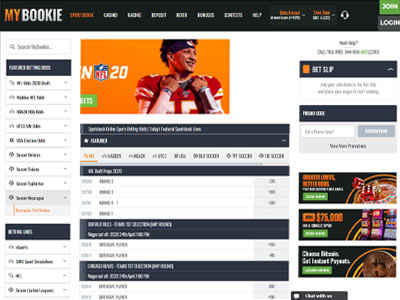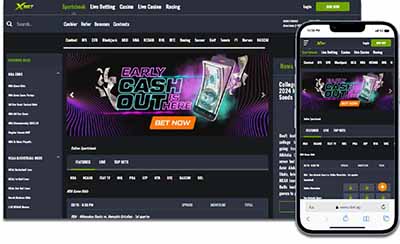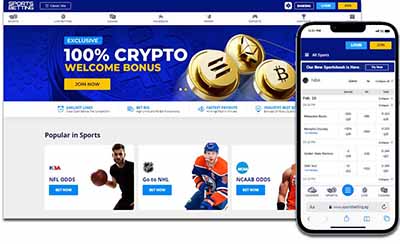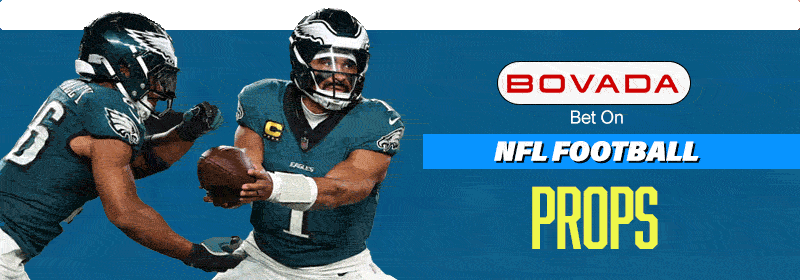Legal Sports Betting In The United States
Through online sportsbooks, legal sports betting in the United States is accessible anywhere and has been this way for many years. While past federal laws have affected states’ ability to monetize the market, gamblers have been legally able to bet on sports from the very beginning. The main law that historically affected the sports betting market in the US is the Professional and Amateur Sports Protection Act (PASPA, 1992). This prevented states from forming their own regulated markets and taxing sports bets.
This law has been repealed, and following this kicked off the current boom of legal US online sportsbooks. Now more than half the country has either launched their own local markets, plans to launch in the near future, or has filed legislation for a potential launch. Legal sports betting is a major topic across the entire US sports landscape now.
Best Legal Sportsbooks For U.S. Players
These are the best option for legal sportsbooks for US players. These operators offer valuable odds and, big bonuses, and are all accessible from anywhere in the country. What makes these operators stand out is that they can be utilized across state lines, not limited to the home state of the bettor. Traveling players can wager from any time anywhere on the go. USA online sportsbook reviews are below, with each section highlighting a specific legal sports betting site that takes US players.
Bovada is the most widely accessible legal sportsbook in the United States. The online operator is available in every state besides New Jersey, New York, Maryland, Nevada, Colorado, Michigan, and Delaware. Not only is Bovada able to offer odds in 43 states, but players can wager legally across state lines, a limitation of regulated operators. Bovada is one of the best options for legal sports betting in the US as they also accept players from every US territory and Washington DC.
BetOnline is one of the best options for legally betting on nonsporting events across the US. Those looking to cash in big betting on the Grammys or an upcoming election can find those odds at BetOnline. These contest betting are rare to find at regulated sportsbooks, making BetOnline a great legal option for even more betting value.
Those looking to legally wager on all college sporting events with no limitations can find odds ta MyBookie. MyBookie offers odds on college sports without any restrictions like instate college teams and events. Many regulated books prohibit college altogether or limit the odds locals are allowed to bet on. Unlimited college betting can be found at MyBookie.
With cryptocurrencies being a major betting method for the majority of the sports betting world, Xbet is a great choice for legal US players. Regulated books (with the exception of Wyoming) do not allow for players to bet using cryptocurrencies. For bettors who want more legal options for how they fund their betting accounts, Xbet is the place to wager.
When looking for some of the best promotions that an online sportsbook has to offer, SportBetting.ag has them all. They offer their bettors some of the most beneficial promotions when it comes to depositing with cryptocurrencies such as Bitcoin. They offer not only a 5% boost on your Bitcoin deposit but they also offer a 100% match on all first-time cryptocurrency deposits and a 35% match when it comes time for your second deposit. They also offer bonuses for credit and debit card deposits as well such as 50% matches up to $1,000.
PASPA Overturned By The Supreme Court!
The Professional and Amateur Sports Protection Act of 1992, better known as PASPA was repealed in 2018 following a landmark case between New Jersey and major sports league dubbed Murphy vs. NCAA. The case went all the way to the Supreme Court, with the SCOTUS siding with New Jersey, viewing PASPA as unconstitutional. PASPA initially only allowed sports betting in select states, with most of the country unable to host their own local betting odds.
Following the repeal, legal sports betting has spread across the country. Every year since 2018 new states go live and offer odds at regulated sportsbooks. The market draws in tens of billions in revenue annually. With PASPA having the biggest effect on the market, the repeal is viewed as what kicked off legal sports betting in the United States.
Mobile Apps For Legal Sports Betting In The United States
In states with regulated online sports betting, sportsbooks host mobile betting apps. Big betting operators like FanDuel, DraftKings, and BetMGM dominate across the US with their mobile apps that many locals use to wager. These apps are downloadable from either the Google Play Store or the Apple App Store and can be accessed on mobile devices. These mobile US sportsbook apps require a download as they are geo-fenced in each state, making them inaccessible outside of the state boundaries. Mobile betting is the most popular way to play with mobile apps making up over 90% of the top US markets.
In-Game Legal Sports Betting For US Residents
Live betting is one of the most prominent ways players wager in the US. Legal sports betting sites and state-sanctioned mobile apps all host in-game betting odds for major sporting events throughout the year. Live betting is one of the foundational ways to bet and many players legally win money constantly with live in-game legal sports betting.
Questions About Legal Sports Betting In The U.S.
Are there exchange rates for USA Online sportsbooks?
Typically, no. The online sportsbooks that are considered to be legal will happily accept US funds and then pay out players in the same currency. Unless noted otherwise, bettors who use American dollars will not have to calculate any exchange rate. This is especially true with any betting website listed at this resource, as these all deal directly with US dollars. One thing to note, however, is that many of these websites do accept Bitcoin, which is technically a currency that has an exchange rate that varies day to day as people trade it on the open market. One of the underrated aspects of using Bitcoin to fund a sportsbook account is that you can make a profit or take a loss simply by purchasing the Bitcoins. The sportsbooks value Bitcoin at an average price similar to the market price, so there shouldn’t be any major exchange rate issues when it comes to Bitcoin.
How do I know where to find legal sportsbooks for USA players?
Betting fans can find legal online sportsbooks here at USAOnlineSportsbooks.com. The books we list are respected, accept all US players, and are safe and secure sites. States with regulated online sports betting have their own set of sportsbooks. Players can find information on those states as well here or by searching their given state’s regulatory page. It is not hard to find legal sportsbooks in the US.
What are some of the laws hindering U.S. online sportsbooks?
The UIGEA is the biggest hindrance when it comes to sports betting laws in the US. This was attached to the Safe Port Act of 2006 as an unrelated (and unread) rider. In short, the UIGEA was intended to make it harder for gamblers to use funds from American banks to make their deposits and – sometimes – to receive check-based payouts. Credit and debit cards like VISA and MasterCard can sometimes be rejected when used in specific transactions with online bookmakers. When this happens, gamblers have a few options available to them: They can use a third party to deposit funds (Western Union, MoneyGram, etc.), they can purchase a prepaid credit card online (which must be good for international purchases), or they can use cryptocurrencies like Bitcoin, Ethereum, Bitcoin Cash, DASH, Litecoin, and others. Bank wire transfers are usually quite stable, as well, and some sites even support a new go-between service called Direct Pay. (The Wire Act, which prevents people from accepting wagers across state lines, is not a hindrance to US online sportsbooks, as these books are not domestically-based.)
By far, the biggest hindrance to online sports betting in the US was PASPA. This law, passed in 1992 and enacted on January 1, 1993, banned all states but Nevada, Delaware, Oregon, and Montana from offering legalized sports betting, and it was the #1 reason why, for example, New Jersey was unable to include sports betting as part of its legal online gambling package that launched in 2013. However, PASPA was overturned by the Supreme Court, thereby allowing every state in the US to legislate its own sports wagering regulations. Many states have now started to provide and accept sports wagers at area casinos and racinos, and legal sports betting in the United States is here to stay.
Are there transaction fees at U.S. Accepted Sportsbooks?
Depending on how one chooses to deposit into their betting account they may find some transaction fees associated. For users who deposit with cryptocurrencies, they may find some requirements for transferring funds from their crypto wallets to their betting accounts. These fees vary from sportsbook to sportsbook, wallet to wallet, and banking method to banking method. The ideal way to play is to find the quickest transaction method with the lowest transaction fee out there.
How many off-Shore Sportsbooks offer lines on American sports?
All offshore sportsbooks offer odds on American sports. These sportsbooks host odds for all major sporting events around the world including the US. In fact, some of the best odds for American sporting events can be found at these online operators.
Can I Be A Member Of An Offshore Sportsbook And A State-Sanctioned Sportsbook Simultaneously?
Not only is it possible to be a member of both offshore and state-sanctioned sportsbooks at the same time, but this is the best way to play. Real hardcore bettors use multiple sportsbooks to try and find the best odds. This is known as line shopping and is the true way to wager. Those who partake in line shopping can see more value from their bets as they will always be wagering with the most profitable odds out there. If you have the option to join both a regulated sportsbook and an international sportsbook then you are doing yourself a disservice by not exploiting that.
Will I Get In Trouble For Betting Sports Online?
No. Online sports betting is legal in the US so no one will get in trouble for betting on sports online. Many markets host their own regulated online sports betting options with mobile betting apps like New Jersey, New York, and Indiana. Even in states like Mississippi and New Mexico that only offer regulated retail sports betting or markets that have not yet launched their own regulated markets can use sports betting sites for legal online sports betting. There are legal options for online sports betting for every US player.
Top Rated State Sanctioned Sportsbooks
 FanDuel
FanDuel
Heralded as the biggest regulated sportsbook in the US, FanDuel offers odds across 15 states. While FanDuel stands out thanks to its patented same game parlays and unique wager doubles, the popular sportsbook is limited in what it can offer based on states’ regulations. In most markets, FanDuel cannot offer odds on in-state college events and FanDuel does not accept cryptocurrencies as a payment method.
 DraftKings
DraftKings
DraftKings runs into a similar issue that other regulated sportsbooks have, limited options for college betting. While DraftKings is indeed home to its betting carousel which hosts unique bets daily, fans of local teams in most states cannot bet on their home team. DraftKings also cant offer college odds at all in some markets.
 BetMGM
BetMGM
Bettors benefit from BetMGM’s rewards program that allows users to stack up points for the MGM Rewards. These points can be used on free bets, game tickets, team merch, and many other rewards. BetMGM is limited in its banking methods, not accepting cryptocurrencies as a wallet depositing or withdrawing method. This is limiting in a world where crypto is a prime way players wager.
 Caesars Sportsbook
Caesars Sportsbook
Caesars Sportsbook hosts a slew of promotional events for users that stand out in the US-regulated markets. Caesars is partnered with several sports teams and they host events that make fans big winners every day. Caesars is limited in its college betting selection in most states, however, outright being unable to offer college odds in several markets.












